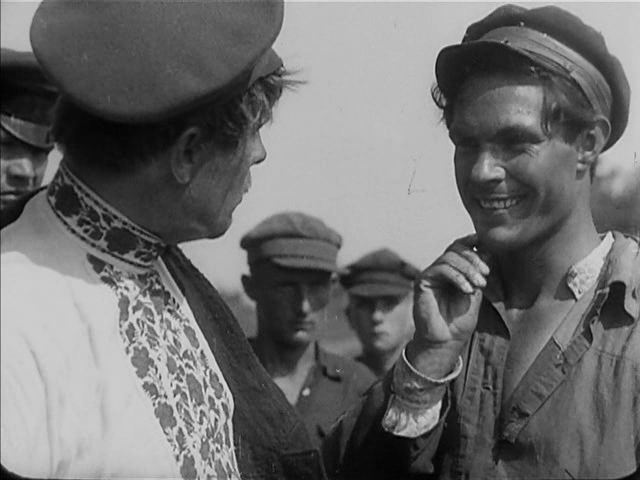|
Okay, 1930 is a lawless time. There's nudity. Straight up a lot of it.
DIRECTOR: Alexandr Dovzhenko I get to review a movie straight from Ukieland! I never get to do this. But after teaching a unit on early Soviet cinema, I was glad to jump all over this. I've seen this one before, but I remembered criminally little of it. In fact, I remembered so little of this movie that I had to Wikipedia the plot at times. I might be a bad teacher. Dovzhenko is known for his unique juxtaposition of scenes and that is definitely seen in Earth. This is a guy who is more about mood than plot. Many of the texts describe Dovzhenko as more poetic than cerebral, which doesn't make a ton of sense until you actually watch one of his movies. The scenes seem completely bizarre at times, often jumping between suicidal and wildly optimistic. There is no forgetting that this is a story that stresses the nobility and exploitation of the worker. Watching this back-to-back with Battleship Potemkin, however, slightly damages the impression of this movie. I'm really a big Battleship fan and Earth touches the same themes with a much more subtle brush. I can't blame this movie for the message being presented, but it was probably a poor decision on my part to watch these two so closely together. I suppose that I warned about the nudity in this movie and I feel a need to talk about it. Like Potemkin, the movie reaches a fever pitch at one point where the world just seems to explode into insanity. This leads to a very surreal ending to the movie. Potemkin places its oddity in the middle of the film and keeps it within the narrative. Earth, however, takes a very different direction with its choice. The movie builds up a weird tension through the mundane. Eisenstein uses the mechanical to develop stress, but Dovzhenko rather uses images of nature and depression to make the viewer beg for release. Yes, the violent ending is cathartic, but it does feel very "art school" angsty. I really like the movie, but there is something truly alienating about the movie as a whole. Often the movie feels like an artifact of the era rather than emotional experience. I feel like such a traitor, the Ukrainian bit and all. It is just that I'm conflicted about this era in history. This is propaganda because all of the movies in this era are propaganda. The quality of this movie is phenomenal. It's gorgeously shot and the mood is something that is both the target and the achieved goal. But I can't personally invest in a lot of this movie which oddly fills me with guilt. So is it the movie's fault? Probably not. But then I shouldn't blame myself completely either.
0 Comments
Leave a Reply. |
Film is great. It can challenge us. It can entertain us. It can puzzle us. It can awaken us.
AuthorMr. H has watched an upsetting amount of movies. They bring him a level of joy that few things have achieved. Archives
July 2024
Categories |

 RSS Feed
RSS Feed